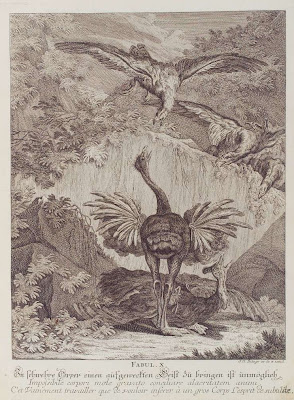
L'opiniatrete en cas de mariage engendre repentance

L'yvresse hout esue decouvre la folie de l'esprit [?]

Un ami dissimulé est plus nuisible qu'un enemi declare

La Precaution Surmonte la Malice

La vangeance d'un inferieur contre'un puissant est nuisible

La vieillesse sans prudence devient meprisable pour des actions pueriles

L'adulation malicieuse est a la fin de couverte et confondue
{I know I've posted this image before...somewhere}
"... the scene is the room of a wealthy man and the drama is enacted by his pets: two dogs, a monkey, a tomcat, and a parrot, who is the man's cherished favorite. The greedy tomcat attempts to lure the parrot from its cage, so that he may capture and feast upon it. The monkey scolds the cat for his malice and ingratitude toward the man of the house and the two faithful dogs attempt to chase the cat away. When the man discovers what happened, the tomcat meets his demise." [source]

Le faste faisant la nique aux autres est confondu lui-meme

Aussi les petits et les mediocres on quelque chose pour
n'etre pas meprisés des grands et des puissants
n'etre pas meprisés des grands et des puissants

C'et vainement travailler que de vouloir
inserer a un gros corps l'esprit de subtilité
inserer a un gros corps l'esprit de subtilité

La convoitise fier et injuste a une issue funeste

La grande pompe couvre souvent la plus rude esclavage

La pompe et la magnificence ne rendent personne plus sage
[
"Johann Elias Ridinger (1698-1766) was a German painter, engraver, draughtsman and publisher. His training included depictions of animals, especially horses, as well as copies of earlier masters. He spent a three-year period in Regensburg where he made many visits to the riding school, which proved decisive for his development. After 1723, he founded an art publishing house, selling prints that he himself designed and engraved: series on hunting, definitions of breeds of horses, illustrated lessons for riding and war-horses, depictions of wild animals and of zoological abnormalities.
Ridinger produced at least 1,600 engraved, etched and scratched sheets showing the characteristic postures of animals in the landscape. In 1759 Ridinger became director of the Augsburg Stadtakademie (school of art). After his death his sons continued to run the publishing house. His most popular series--such as this one-- continued to be reprinted until well into the 19th Century, and were also adapted to other media, such as wall decoration, porcelain and ceramics." [source: a, b]
- 'Lehrreiche Fabeln aus dem Reich der Thiere' (Instructive Fables from the Animal Kingdom) 1744 by Johann Elias Ridinger is online at HAB Wolfenbüttel.
- 25 more animal pictures at the Fine Arts Museum of San Francisco.
- Ridinger contributed the majority of illustration work to the beautiful 4-volume botanical work by Johann Weinmann - 'Phytanthoza Iconographia' at Illustrated Garden (*).
- Another series of animal plates at Biblioteca Casanatense.
- I'm still not sure what I think about this rather idiosyncratic site (mostly) devoted to Ridinger.
- Abe books on 'Fabeln aus dem Reiche der Thiere'.



No comments:
Post a Comment